Philadelphia Compliance and Ethics Roundtable: Mergers and Acquisitions
Fall 2024
The Center for Compliance and Ethics will host its second Philadelphia Compliance & Ethics Roundtable at Duane Morris’s Center City Offices on Nov. 21, 2024, at 12:30 p.m. At this gathering for compliance professionals in the Philadelphia area, Matthew J.D. Hogan, Vice President and Assistance General Counsel, Government Affairs, at Aramark, will present on the topic of compliance in the mergers and acquisitions context. All compliance practitioners are welcome for this opportunity to network, share skills, and gain valuable insights. To RSVP, please e-mail compliancelaw@temple.edu.
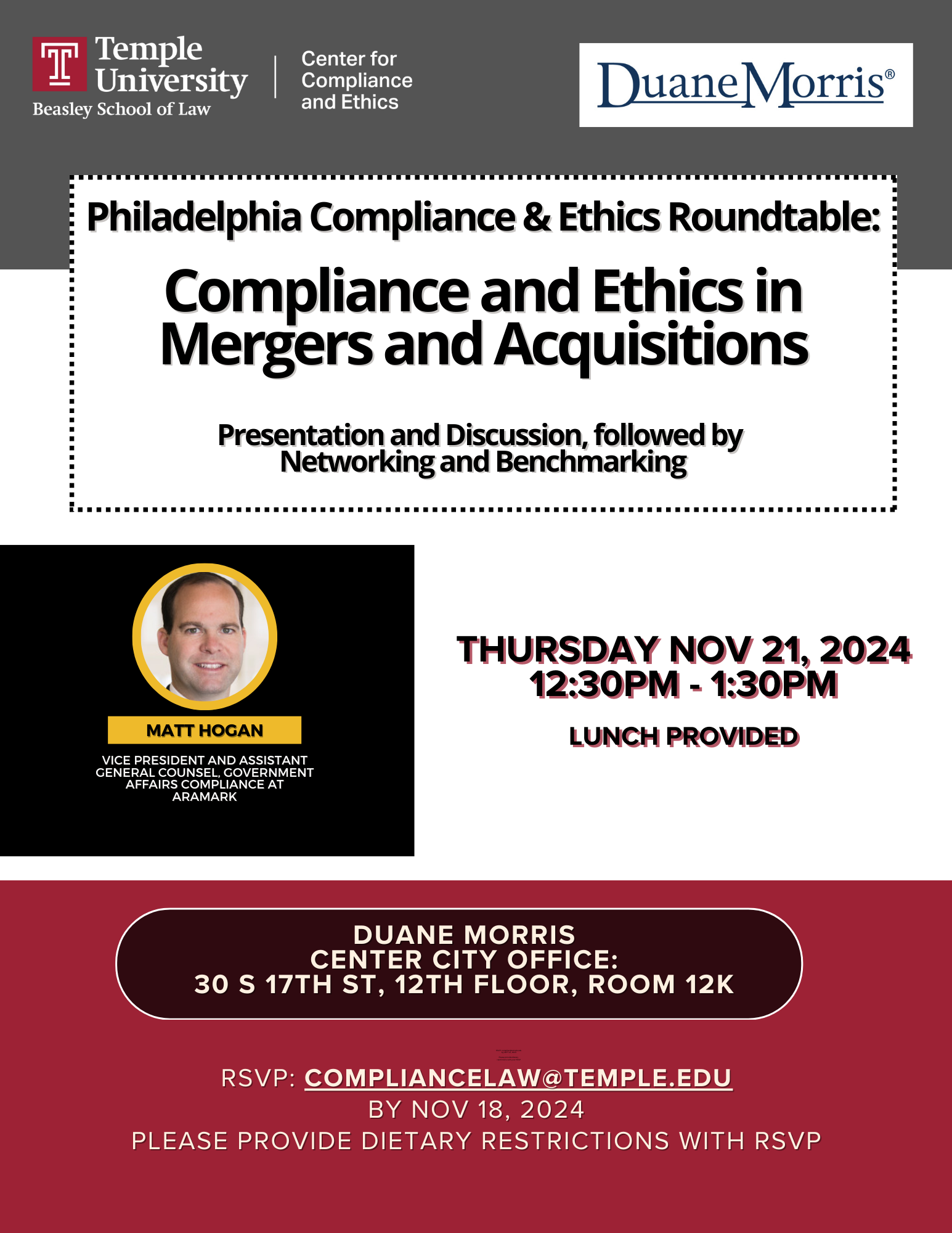
Careers in Compliance and Ethics Panel Discussion
October 2024
In October, the Center had the pleasure of welcoming three distinguished compliance professionals who shared their stories and insights with students over lunch.
Steve Harris, Senior Vice President and Chief Ethics & Compliance Officer at Lincoln Financial; Jeremy Menkowitz, Corporate VP and Senior Deputy General Counsel at Comcast Corporation; and Cynthia Schneider, Chief Deputy City Solicitor of the Compliance Unit at the City of Philadelphia Law Department, each spoke about their career journeys.
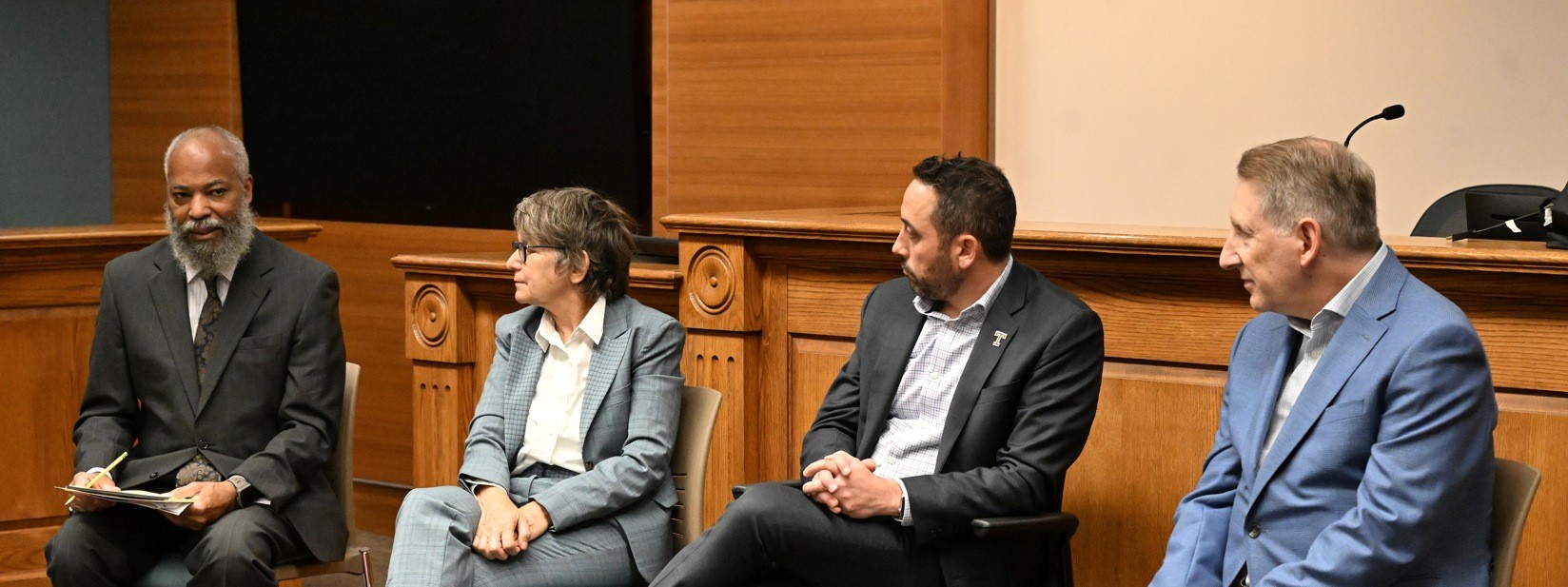
The presenters offered valuable perspectives on compliance leadership within their respective industries, and students had the opportunity to ask a range of questions about what a career in compliance entails.
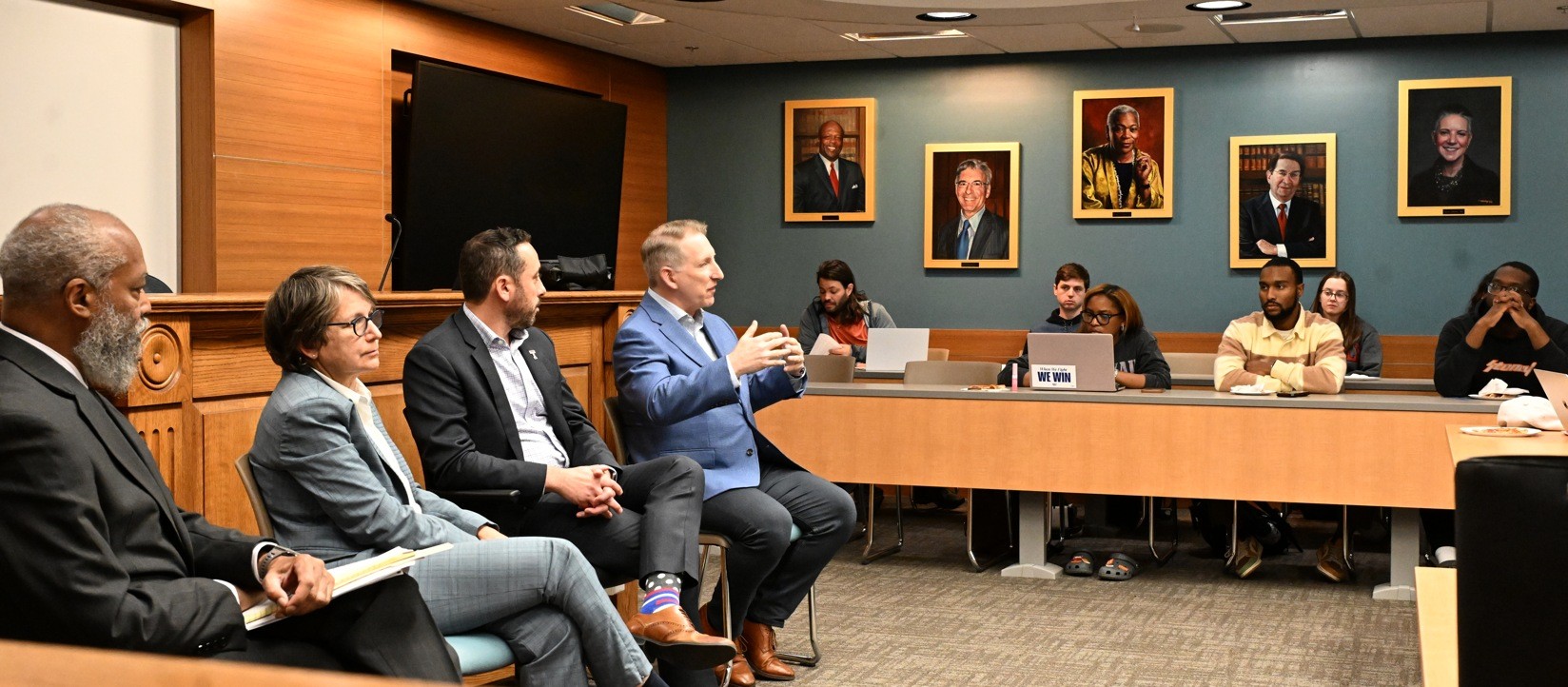
Bridging the Gap: The Practice of Law and the Practice of Compliance & Ethics
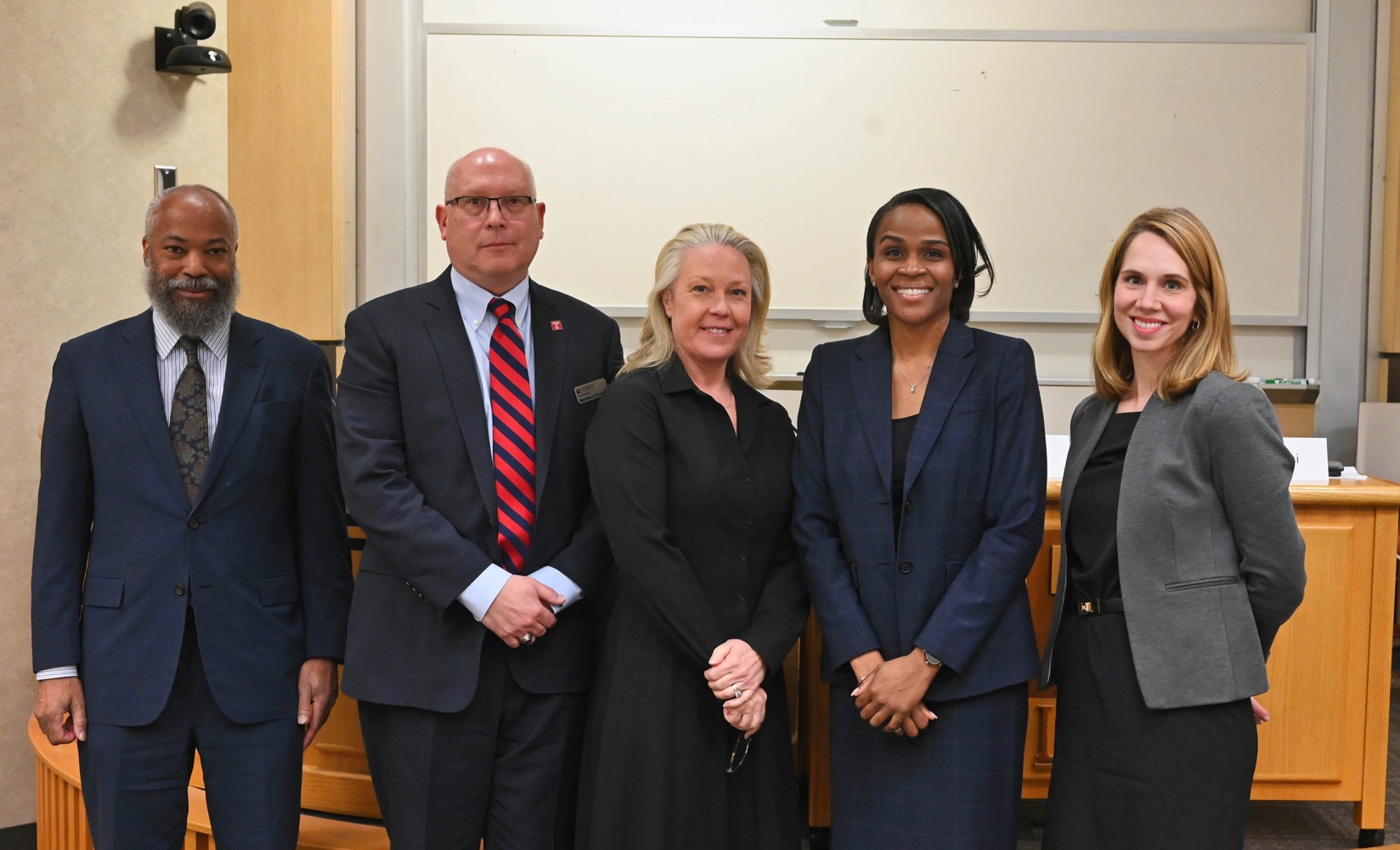
April 2024
In April, the Center hosted the panel discussion, “Bridging the Gap: The Practice of Law and the Practice of Compliance & Ethics,” featuring Temple Law Alumni whose careers have included both substantial legal responsibilities and substantial compliance responsibilities. The panel included Charlene Davis, Cailin Heilig, Heather Ritch Rocks, and Robert Rossi. Panelists shared their insights from various perspectives including private sector law, in-house, pharma, and financial services on how compliance and legal issues can intersect and the need for lawyers to be nimble in bridging the “gap” between legal and compliance issues.
Lecture by Visiting Professor Paolo Butturini J.D., PhD.
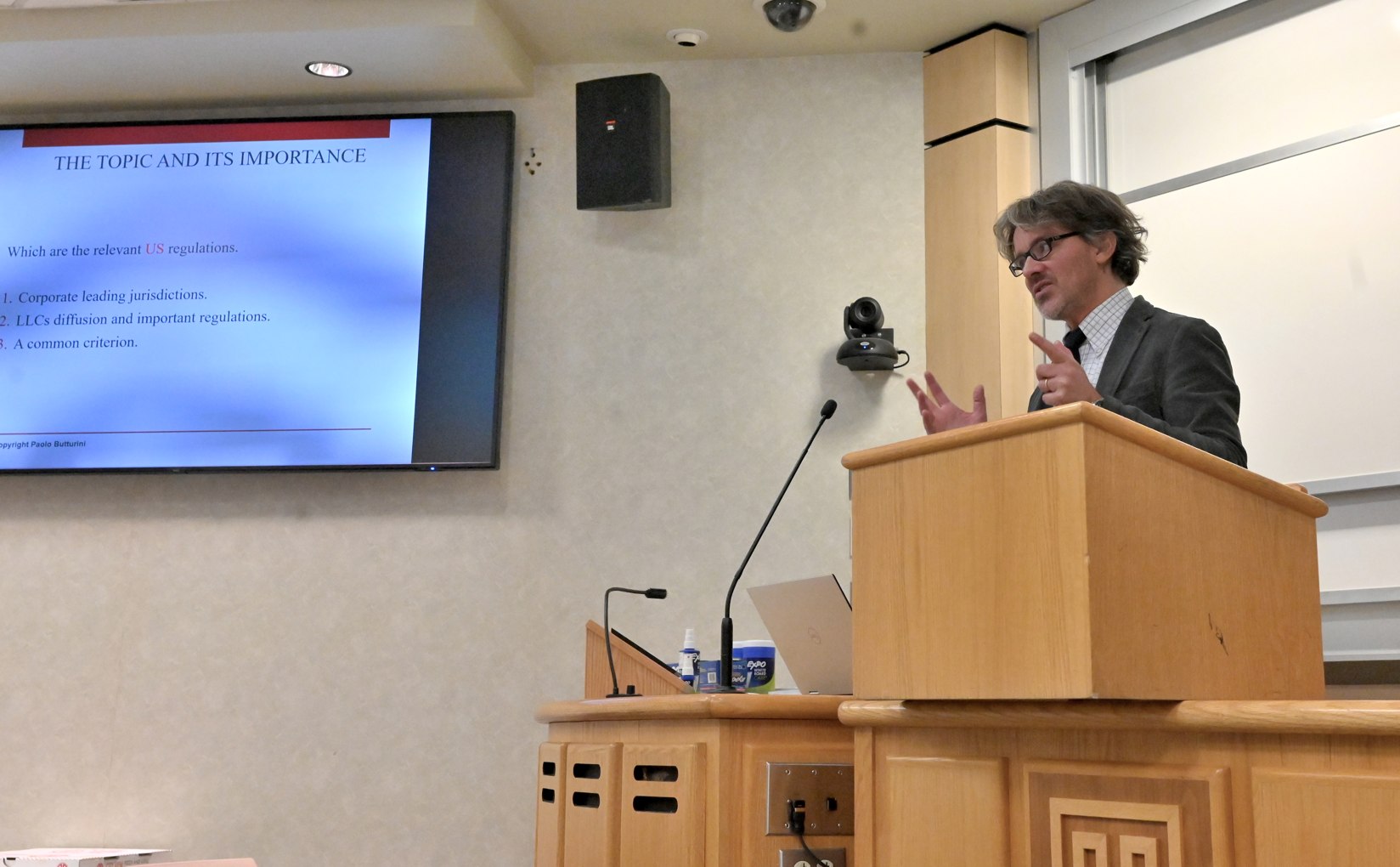
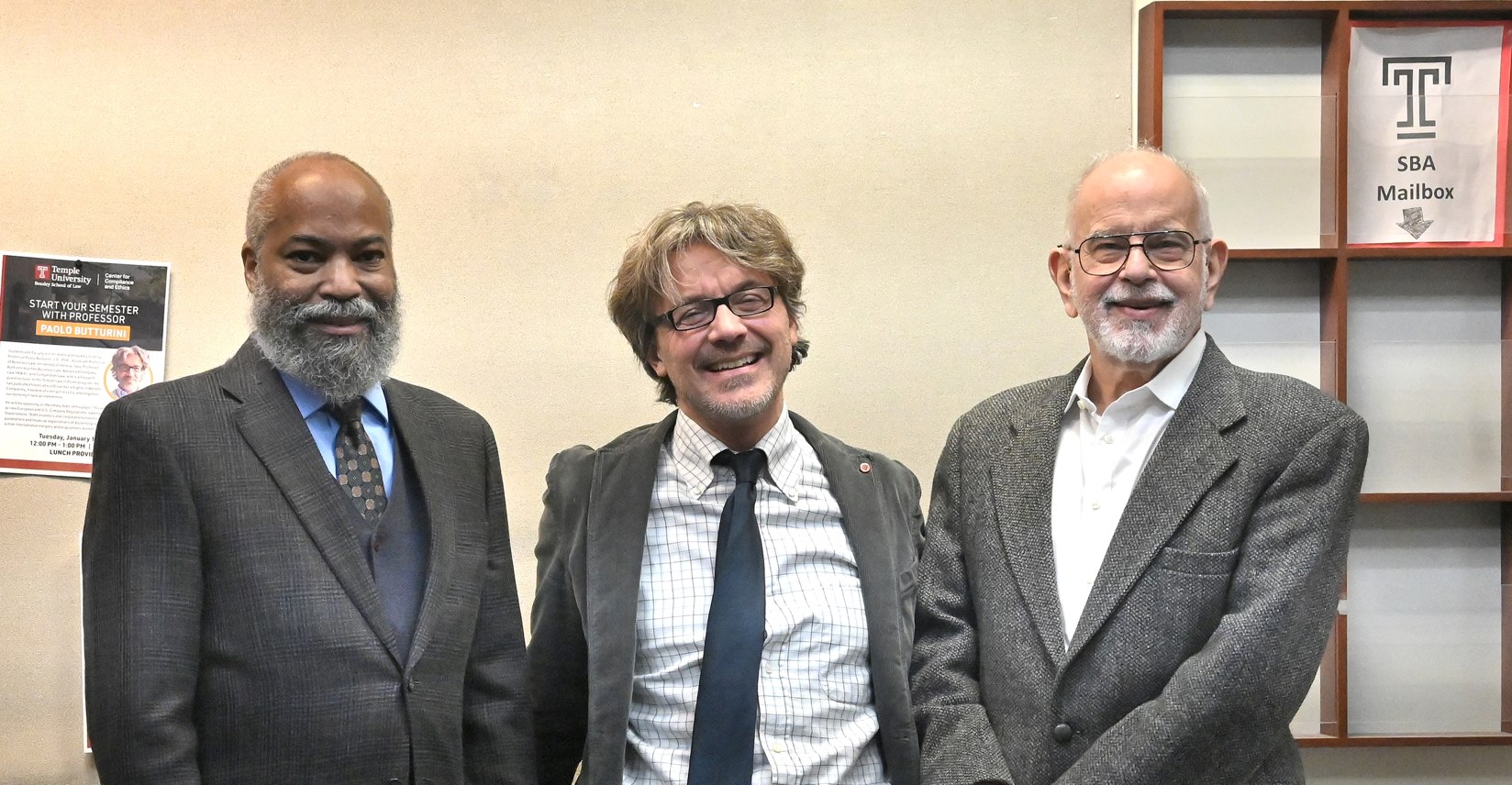
January 2024
In January, the Center for Compliance & Ethics hosted a lecture by Visiting Professor Paolo Butturini J.D., PhD., Associate Professor of Business Law, of the University of Verona, Italy. Professor Butturini teaches Business Law, Advanced Company Law (M&A), and Competition Law, and is a frequent guest lecturer in the Temple Law in Rome program. He has published books about Dissenter’s Rights in Benefit Companies, freedom of contract in LLCs, and litigation surrounding financial statements.
He spoke to students and faculty on the timely topic of his paper, “Dissenters’ Rights Evolution across European and U.S. Company Regulations: Lawmakers’ Choices and Investors’ Expectations.” Both investors and corporations need to understand the regulatory parameters and financial expectations of dissenting investors’ right in the increasingly active mergers and acquisitions space.
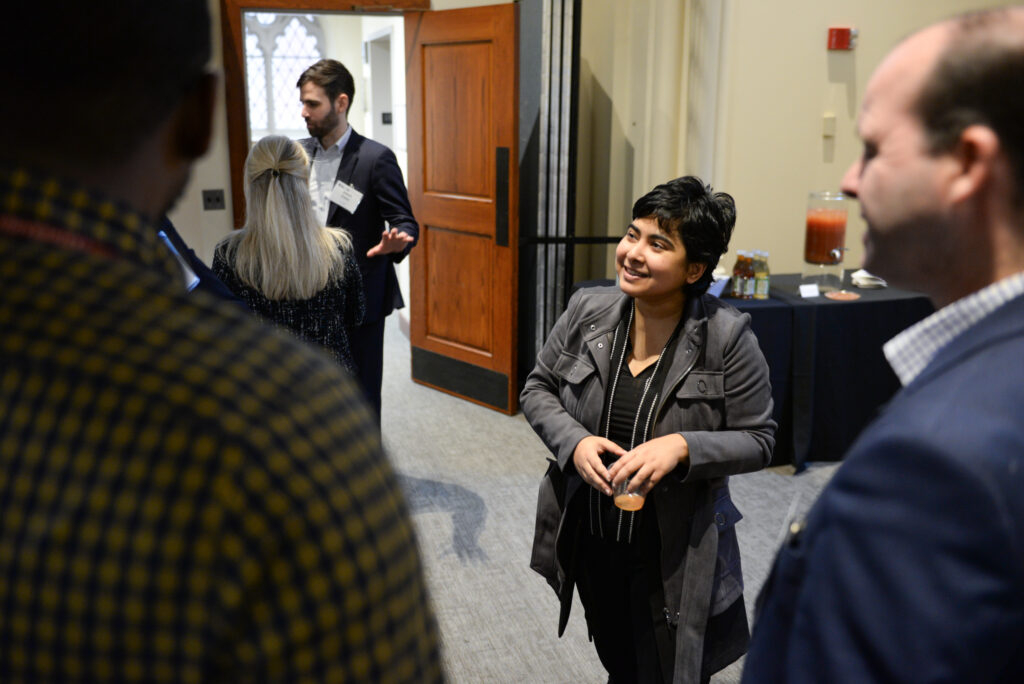
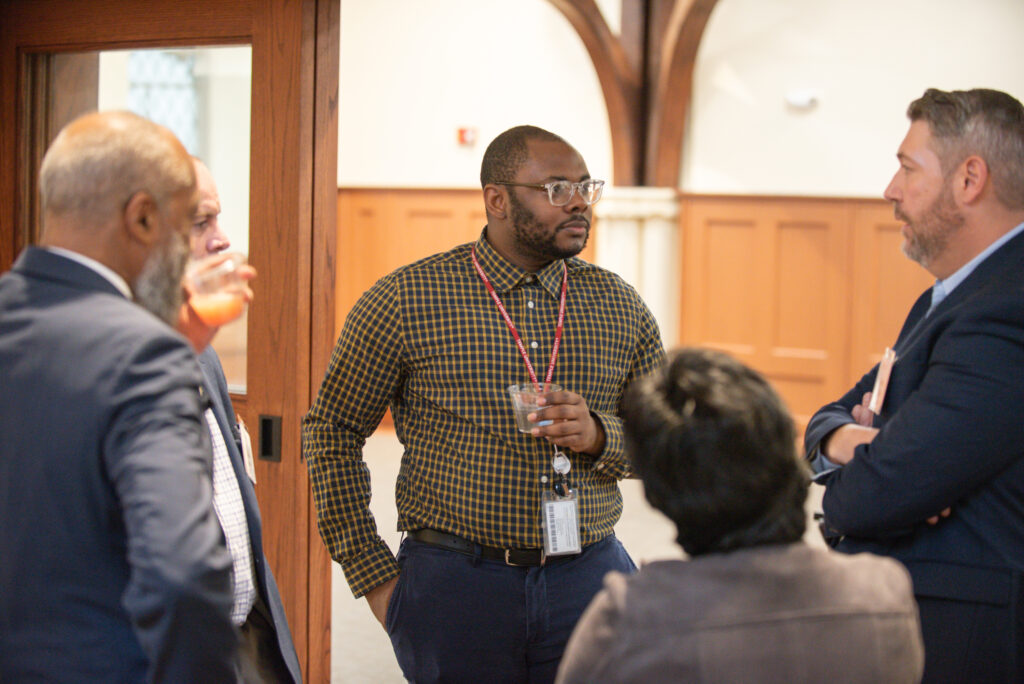
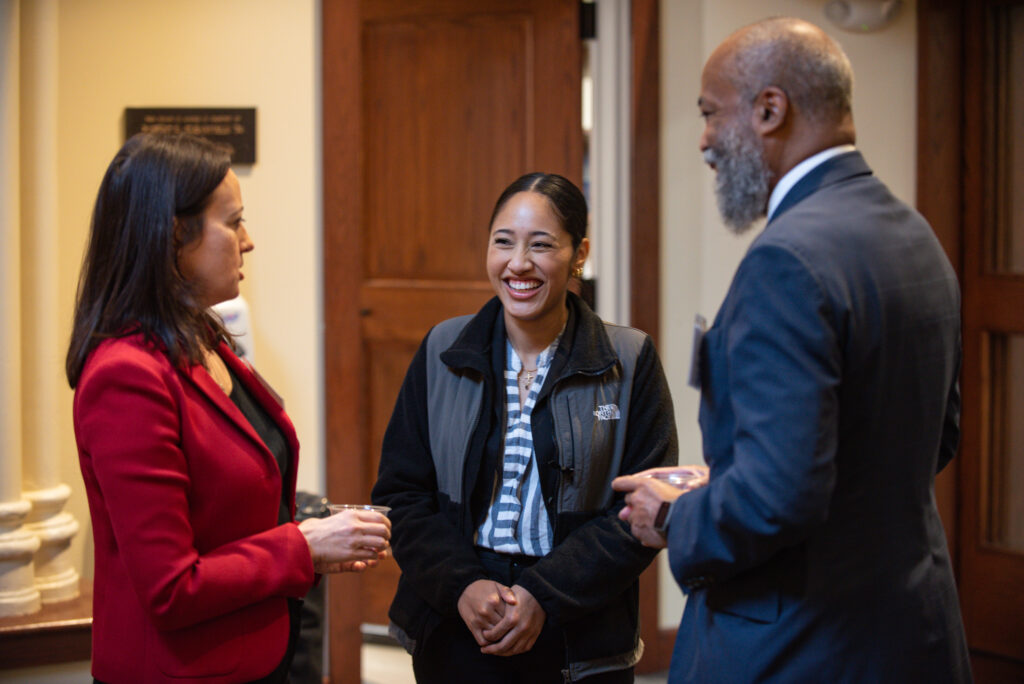
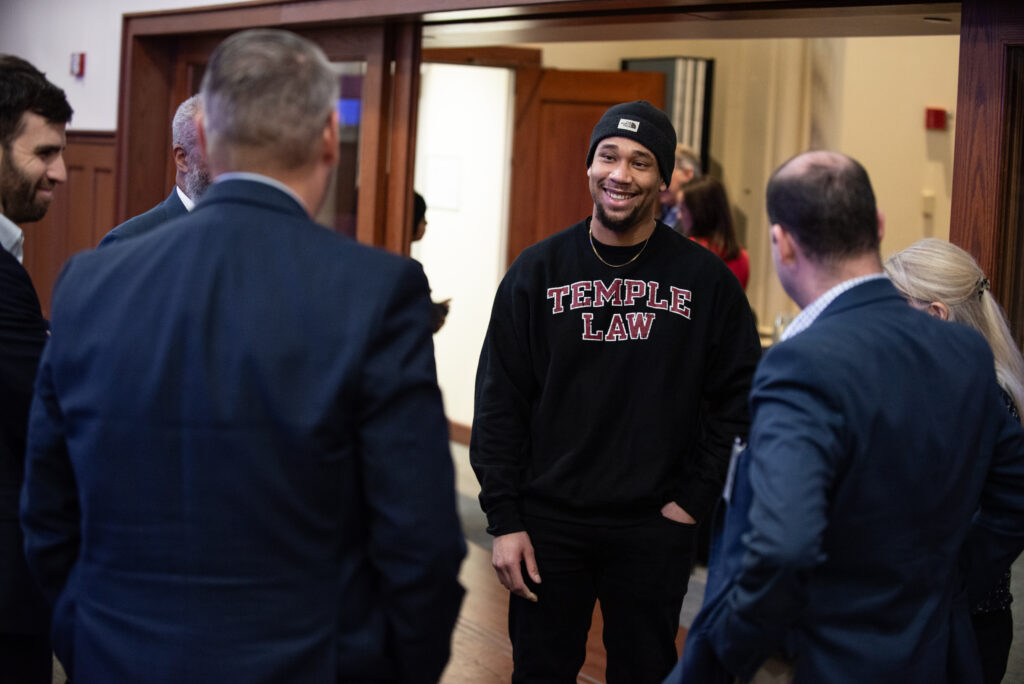
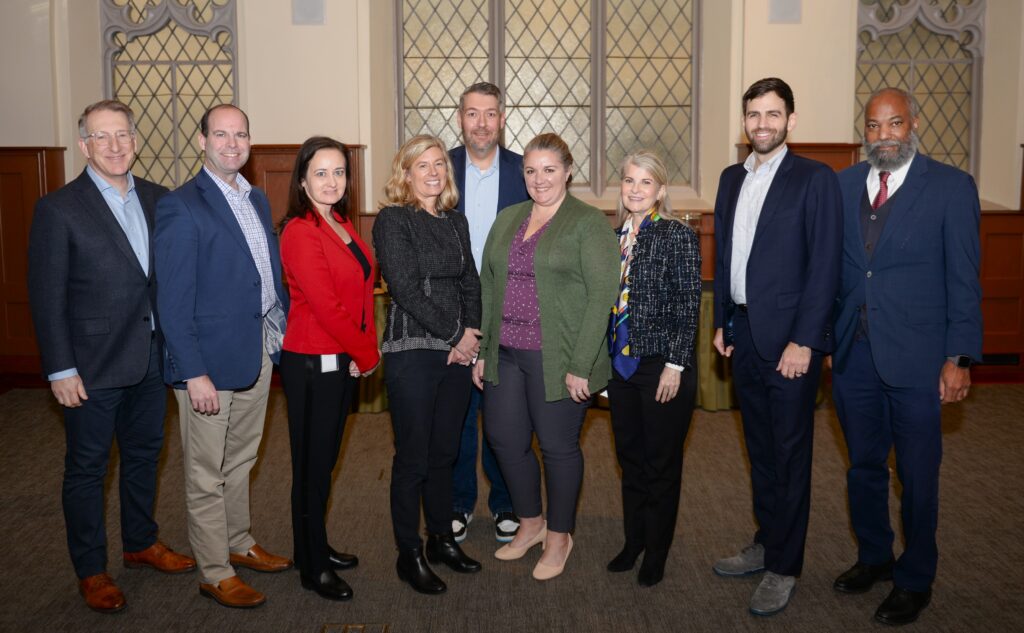
“What Keeps You Up at Night?” Roundtable
December 2023
In December, the Center for Compliance & Ethics hosted “What Keeps You Up at Night?” an Ethics CLE and Roundtable specifically for Chief Compliance & Ethics Officers and Deputy Chief Compliance Officers to share ideas and concerns on topics not currently addressed by courts, enforcement authorities, or guidance documents. Chatham House Rules preserved confidentiality of speakers and affiliations. The confidential Roundtable discussion featured the sharing of best practices on whistleblowing and other challenges faced by high-level compliance professionals.
Among the CLE topics were “Corporations as the New Whistleblowers,” discussing the challenges presented by traditional incentives encouraging internal reporting versus the 2018 Supreme Court decision limiting whistleblower protections if not reported to the SEC.
Careers in Compliance Panel
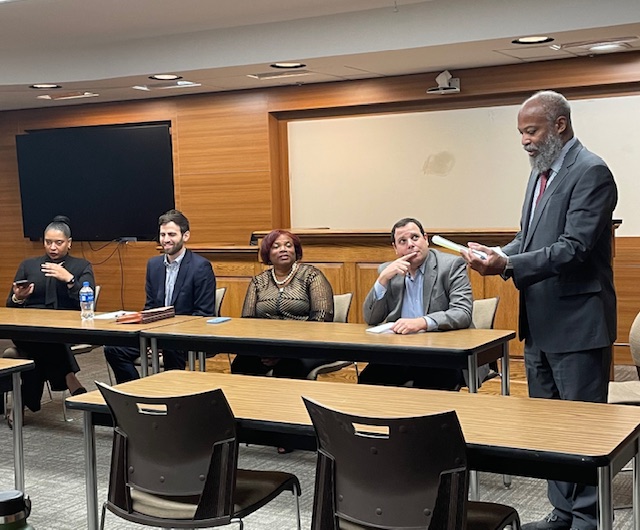
October 2023
On October 12,2023, the Center for Compliance & Ethics welcomed four outstanding compliance and ethics professionals—Jason Conn, Denise Sanchez, Jordan Segall, and Yvette Warren—to speak to the law students about this growing area of law. The panelists, whose practice encompass pharmaceuticals, environmental, and financial to communications and entertainment, shared important insights about the expansion and impact of this legal field. Panelists spoke about their individual career paths and how they arrived at their current leadership positions in compliance. The interested students asked a variety of questions about aspects of compliance and ethics and how they might gain exposure to this area early in their legal education and prospective careers.
Center for Compliance & Ethics Information Session for Law Students
September 2023
Prior to the October 18th Careers in Compliance Panel, the Center for Compliance and Ethics hosted a lunchtime information session where students could learn about the foundations of compliance. Michael Donnella, the Center Director, provided students with a comprehensive overview of what compliance is and what a legal career in compliance could look like, reflecting his thirty-plus years of professional experience. For most student attendees, it was their first exposure to this growing area of law, and they were highly engaged, posing questions about preparing for Compliance & Ethics classes, Compliance & Ethics opportunities during law school, and where compliance may intersect with the varying careers within the legal profession.
Women Leaders in Compliance


June 2023
On June 1st, Temple Law School’s Center for Compliance & Ethics hosted its second “Women Leaders in Compliance” event. It was a fantastic gathering with some of Philadelphia’s top women Compliance and Ethics professionals, who were able to build connections and expand their networks with many women leaders they will be able to call on for benchmarking and mentorship. A special thank you to the women leaders from our Advisory Board who helped put this wonderful event together—Tamsin Fast, Abigail Hazlett, Kiley Smith Kelly, and Caroline West. Thank you to Ernst & Young for hosting the event at their beautiful facility.
Please sign up for the Center’s newsletters to stay updated on future events.
Careers in Compliance Panel
October 2022
Four accomplished compliance and ethics professionals—Jason Conn, Robert Kumor, Yvette Warren, and Caroline West—spoke at the career panel held at Temple University Beasley School of Law. The panelists, whose practice industries range from pharmaceuticals to communications and entertainment to financial, shared valuable insight into what makes compliance and ethics an attractive career path and how they ended up becoming leaders in their field. Students asked astute questions about the breadth of compliance and ethics and ways to get exposed to compliance and ethics early in their prospective careers.
To watch a recording of the information session, please visit this link.
Center for Compliance and Ethics Information Session
October 2022
As a precursor to the October 18th panel titled Careers in Compliance, the Center for Compliance and Ethics hosted an information session for students to learn about the foundations of compliance. The Center’s director, Michael Donella, provided students with a comprehensive description of what compliance is and what a career in compliance could look like using his thirty-plus years of professional experience. During this hour-long information session, inquiring students posed fascinating questions on topics such as the hiring process for a compliance position, government agency compliance positions, and the origins of the compliance field.
To watch a recording of the information session, please visit this link.
Women Leaders in Compliance Executive Education Program
June 2019
Temple Law School’s Center for Compliance and Ethics hosted twelve phenomenal women leaders to speak at its “Women Leaders in Compliance” executive education program. The event was hosted at The Union League in Philadelphia, and all attendees earned one substantive CLE credit. Compliance and ethics as a discipline presents unique opportunities for women to advance into senior leadership roles, and research has shown that across industries, women in compliance and ethics positions thrive. During this half-day executive education seminar hosted by Temple Law’s Center for Compliance and Ethics, women in senior roles shared their wisdom on succeeding in this diverse, challenging, and richly rewarding field.
To watch a recording of the program please visit this link.
SEC Leadership Roundtable
October 2019
Temple Law School’s Center for Compliance and Ethics played host to a gathering of compliance officers, private practitioners, and in-house counsel at a roundtable with SEC leadership Stephanie Avakian LAW ’95, Co-Director of the Division of Enforcement, and Jeffrey Boujoukos LAW ’92, Director of the Philadelphia regional office. On the table for discussion were several topics, including cryptocurrencies and cyber-fraud, their perspective on cooperation credit, and Ponzi schemes. The roundtable took place on October 29, 2019 at the Philadelphia office of Holland and Knight, a member of the Center’s Advisory Board.
Advances in technology informed much of the discussion, from whether a particular cryptocurrency should be considered a security to the use of data analytics to identify and address risk areas. However, Avakian and Boujoukos emphasized that more familiar forms of fraud and traditional Ponzi schemes remained high priorities, and discussed SEC efforts to combat such initiatives, including educational forums for investors, in particular at-risk populations like the elderly.
Also of significant interest was the agency’s take on extending cooperation credit in ongoing investigations. A key component of that analysis, according to Avakian and Boujoukos, is the extent to which such cooperation helped to conserve agency resources during the investigation. Industry participants were also eager to hear about future policy goals and enforcement trends, for which the agency leaders indicated that public resources like the SEC’s Enforcement Manual and the Office of Compliance Inspections and Examinations’ Risk Alerts were excellent resources.
The roundtable, which was moderated by Temple Law professors Harwell Wells, Jon Smollen, and Tom Lin, is part of the Compliance Center’s commitment to facilitating dialogue between the private and public sectors in advancement of effective, proactive, and sustainable approaches to compliance and ethics challenges.
“Corrupt Crime in the Age of Trump”
March 2019
Editor’s note: Guest author Prina Patel is a second-year law student at Temple University Beasley School of Law, interested in pursuing a career in healthcare compliance, and will be participating as a fellow in the Temple Law Summer Compliance Fellowship Program this summer.
The Center for Compliance and Ethics welcomed Hui Chen, the first ever Compliance Expert at the Department of Justice Fraud Section, to Temple Law on Presidents’ Day for a wide-ranging talk about compliance, ethics, and personal morality.
To say that Ms. Chen has a diverse work profile would be an understatement. She’s a global citizen, and it’s not just her work as an attorney that’s taken her around the globe. When she finds herself discontent with her work, she uses her moral compass and intuition to re-calibrate her career path, and it’s taken her in some interesting directions. She’s gone from working as a minister in New Jersey to doing compliance work for Microsoft at the Beijing Olympics. She’s worked on emerging market lending in London and toured the Amazonian rainforest. To explore her passion for food, she called to get a job as a part-time sous chef in different restaurants in Italy.
That said, her work as an attorney has taken her far and wide as well, from an earlier role as a trial attorney in the criminal division of the DOJ to several high profile inhouse roles in global corporations in the tech, financial, and pharmaceutical industries. It was with the perspective of these varied experiences that she returned to the DOJ in November 2015 as the first ever compliance expert within the fraud section, an incredibly important and influential position. “[The creation of the role and resulting work] was actually so popular, that there was actually thought of expanding,” she said. But the 2016 election changed everything for Chen. The ethical and compliance-related inconsistencies of the new administration began to trouble her, and she found herself again discontent with her work. “One of the things that was really important to me was really having that credibility to be asking the questions that you’re asking.” When the surrounding circumstances called that credibility into question, Chen began to wonder whether she would be able to fulfill the duties of her job.
When former FBI Director James Comey was fired in May 2017, Chen knew it was time to walk away. “I thought that if a company had come in [to the DOJ] and told a story that was essentially the head of our investigation was fired because he was looking into the CEO’s friend, and the CEO told him to drop it and he didn’t, that would give me serious concerns about their compliance program. Yet, that’s what I saw happening…and I was very troubled by that.”
What does Ms. Chen think lies ahead for the DOJ? “Watch where the resources go,” she said, “to figure out what the priorities are.” She noted that the DOJ’s new budget proposal prioritizes gun and drug prosecutions, not white collar crimes. In fact, she says, the leadership of the DOJ has minimal background in white collar prosecution itself. For herself, she is working as an independent compliance consultant speaking, writing, and working to protect our democracy.
While we often sandwich the terms “compliance” and “ethics” together, Ms. Chen emphasized to the audience that sometimes these two terms actually diverge. We’re seeing this divergence play out in the current social and political climate, she says, in which some would argue that what constitutes compliance does not constitute ethical conduct. “Compliance, by definition, is doing what the law requires. Think about what that means if you are living under apartheid, or in 1930’s Germany. If you’re ethical, if you have your own ethical compass, then you might choose not to comply.” For law students soon to be entering the profession, it’s going to be difficult to grapple with these issues, and it was inspiring to see Ms. Chen thoughtfully navigating this murky terrain while maintaining her sense of morality, balance, and self.
Current Trends in Compliance and Enforcement
April 2016
The Temple Law Center for Compliance and Ethics welcomed former US Attorney General to the Union League earlier this month as part of its CLE series, “Current Trends in Compliance and Enforcement.”
Mr. Holder touched on a number of issues involving both compliance and civil rights in a wide-ranging interview with Mike Holston, Executive Vice President and Chief Compliance Officer at Merck Pharmaceutical. After exploring the DOJ’s treatment of FCPA cases and the impact of corporate cooperation and transparency on the Department’s decision about whether to prosecute, they turned to the impact Mr. Holder’s work in the private sector had on his public service.
“It was better to have had the experience of having represented companies in between my positions in the Justice Department,” he reflected. “By and large, big companies are trying to do the right thing. If people in the DOJ could take a sabbatical for a few years, maybe work on the defense side, they would be better prosecutors.”
Additional topics ranged from the impact of the Yates memo on corporations’ ability to conduct an internal investigation, criticism of the DOJ’s prosecutorial decisions with respect to the banking collapse, and Mr. Holder’s decision not to defend the constitutionality of DOMA.
Co-Sponsored By:
Covington and Burling, LLP
Berkeley Research Group
US Attorney Zane Memeger: Actual, Tangible Compliance Matters
November 2015
US Attorney for the Eastern District of Pennsylvania Zane Memeger addressed an audience gathered at the Temple Center for Compliance and Ethics’ November CLE event, making the case for why companies should develop and maintain a vigorous internal compliance program.
“Actual, tangible compliance matters,” Memeger told the audience before describing the factors his office uses to evaluate a company’s compliance efforts. He said that the several factors currently in use were intended to illuminate how effectively the company incorporated compliance into its daily business practices. Those factors included:
- A historical track record of a culture of compliance
- Clear, well-written policies for employees
- A compliance officer with decision-making authority, resources, and access to information
- Proactive investigation of potential issues
- Ongoing training and education of management employees
- Encouragement for employees to report issues without fear of retribution
- Meaningful discipline for upper-level employees who engage in misconduct
- Regular review of the program for continued effectiveness.
While noting that most compliance violations do not result in criminal prosecutions, Memeger remarked that his office has begun to focus more sharply on the individual persons responsible for misconduct within a business. “The prosecution of a company does not replace the prosecution of an individually culpable person,” Memeger said. “Individuals will only change their behavior if they know they will go to jail or lose their jobs.”
